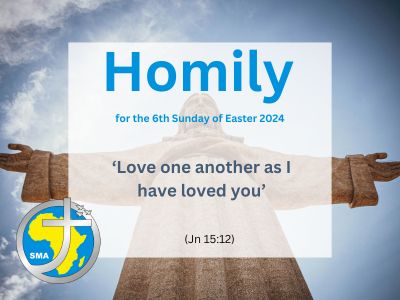Readings: Acts 10:25-26, 34-35, 44-48; 1Jn 4:7-10; Jn 15: 9-17
Theme: ‘Love one another as I have loved you’ (Jn 15:12)
We usually remember the last words spoken by those who were specially dear to us. Jesus’ disciples not only remembered the last words of Jesus: they practised them; they lived them. Through their experience of the Risen Christ and the outpouring of his Spirit, they had left behind the darkness of night and emerged into the dawning light of God’s love and their lives were changed utterly. Church historians, like Adolf von Harnack, have attested to the extraordinary fidelity of the first Christian community to carrying out Jesus’ final instruction to his disciples on the eve of his death: ‘Love one another as I have loved you’ (Jn 15:12), an instruction repeated twice in today’s gospel reading.
The manner in which early Christians understood and lived this great commandment of love is illustrated by the testimony of Aristides, a second century Greek philosopher. Writing to the Emperor Hadrian in defence of the Christians he states that: ‘Christians love one another. They never fail to help widows; they save orphans from those who would hurt them. If one member of the community has something, he gives freely to those who have nothing…. There is something divine in them.’ Their love was not mere words or pious gestures, but a practical love, expressed in deeds of caring service – service especially of the poor and those most in need. It was the kind of love that, in the words of St Augustine ‘has hands to help others, feet to hasten to the poor and needy, eyes to see misery and want, and ears to hear the sighs and sorrows of people’. Sadly, as Mahatma Gandhi has observed, many who have dared to call themselves Christian have failed to follow the admirable example of the early Christians. Instead, by their hatreds and prejudices, their divisions and violence, they have often given counter-witness to the explicit command of Jesus to love one another.
In contemporary discourse, as Pope Benedict XVI pointed out in his first admirably short encyclical letter, God is Love, love has become much debased and misused word, a word used even to cover up what is the very opposite of love – domination and exploitation of others for one’s own selfish interests. The love Jesus calls on his disciples to practice is, in the words of Adolf von Harnack, ‘a thing of power and action’, a reflection and expression of the divine energy that brought the universe into being. It is a love that is ever faithful and constant. It is the kind of love that draws us out of our comfort zones, and motivates us to give our time, our energy, our talents, and, indeed our very selves to others. And to do this not just when we feel in good form, or for a short time, but to do it in season and out of season, in good times and bad, until, in the words of St Paul, our life has been ‘poured out like a libation’ (2 Tim 4:6). But we can only do this when we experience ourselves as loved with a love that is unconditional and unlimited – when we experience God’s love for us.
The love that has its origin in God is a love that is universal and unrestricted in scope, open to all, irrespective of class or ethnicity. This truth is clearly underlined in today’s first reading from the Acts of he Apostles, which tells the story of the reception and baptism of the gentile Cornelius and his family into the Christian community. This unforgettable story shows us how the early Christians are led by the Spirit to overcome their innate prejudices and antipathy to the Gentiles, and to accept them into their community. As Peter comes to realise, ‘the truth is… that God does not have favourites, but that anybody of any nationality who fears God and does what is right is acceptable to him’ (Acts 10:34-35). God loves and cares for everyone, and his Spirit is present and active in the strangest places, in and through persons and situations where we might least expect God to be present, situations that invariably take us by surprise.
The spiritual journey that led Peter to welcome Cornelius into the Christian family was a journey of discovery into the outreaches of divine love. It is a journey that remains unfinished, a journey we are all called to make over and over again, as we strive to live out, in the circumstances of our time and place, Jesus’ great commandment of love. Love is the one and only power that will truly transform the world and draw it home to its divine source, the God of Love. In the stirring words of that great modern scientist and mystic, Teilhard de Chardin,
‘The day will come when,
after harnessing space,
the winds,
the tides,
and gravitation,
we shall harness for God the energies of love.
And on that day,
for the second time in the history of the world,
we shall have discovered fire.’
Today’s gospel challenges us to keep alive that hope by taking to heart the great commandment of Jesus: ‘Love one another as I have loved you’.
Michael McCabe SMA
Click on the play button below to listen to an alternative homily from Fr Tom Casey SMA.

